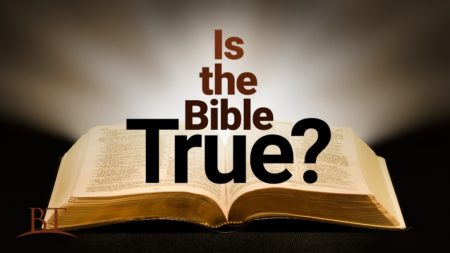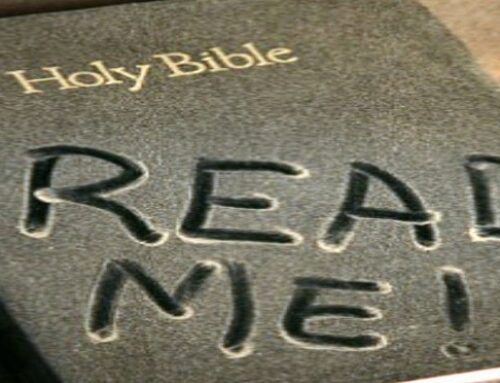Is the Bible True?
May 9, 2018
Categories: Bible
I was listening to a talk by Jared Byas on the topic of whether the Bible was true. He had an interesting take on the question, and I thought it might be helpful to share some of what he talked about.
Questioning the Bible Can Cause a Firestorm
Before I get into what Jared shared, I want to acknowledge that this can be a difficult question for Christians to think about and discuss. Most Christians believe that the Bible is the Word of God and that it is inspired by God. So, the Bible definitely holds more weight than the average book. But it has been difficult to agree about what “Word of God” or “inspired” actually means, and different Christian denominations treat the Bible differently. Some Christians believe the Bible is inerrant and infallible, meaning that every word in the Bible is factually true (without any mistakes). Other Christians believe that the Bible is important, but some of the stories didn’t actually happen in history. And there is a lot of nuance and space in between. So, the question “Is the Bible true?” is complex and difficult.
3 Ways People Use the Word “True”
Jared’s main point was that when we ask the question: “Is the Bible true?” we need to be clear about what we mean by the word “true.” He said that, in general, people mean one of three things when they use the word “true”:
- True regarding historical facts. The first meaning of the word true has to do with whether something is historically true. In other words, did it happen exactly as it was described in the text? This is a sticking point for many people, because they have a hard time believing that certain things the Bible describes were historically true (e.g., God creating the world in 7 24-hour days, Jonah being swallowed by the fish, etc.). When we think about this first point, it’s important to recognize that some passages aren’t meant to be understood as historically true. For example, when the Bible says that Jesus told a parable, the parable itself wasn’t meant to be historically true—it was meant to be a made-up story that reflected a deeper truth about human nature or God. We wouldn’t be upset to learn that the story of the Good Samaritan wasn’t historically true—that isn’t the point of a parable. But there are other aspects of the Bible that were intended to be understood as historically true by the writers. Jared argues that the Bible is historically true in some cases, and it is not historically true in other cases. Sometimes this has to do with the understanding of the writers at the time. For example, they didn’t have access to modern science and technology, so their writing reflects their understanding of the world at that time. Also, some of the historical inaccuracies have to do with how ancient cultures communicated. For example, the numbers in the conquest accounts are likely exaggerated, but it was common practice for ancient cultures to exaggerate their conquest accounts.
- True regarding human nature or God. The second meaning of the word true has to do with whether something reflects a deeper truth about human nature or God. For example, some Christians don’t view the creation story in Genesis as historically true, because of the scientific evidence regarding the age of the earth and universe, dinosaurs, and speed of light, among other things. But the creation story could be true in another sense—that it communicates truths about human nature and God. For example, human beings are designed for community. It’s not good for humans to be alone. We have a responsibility to tend for and take care of the earth. We struggle to live our life according to God’s plan for our lives and engage in sin, which separates us from God. Sin has consequences—for ourselves, our relationships, and the earth. God sticks with us, even when we make decisions that hurt ourselves and our relationship with God. So, sometimes the Bible isn’t necessarily historically true, but it can be true in a deeper sense.
- True regarding wisdom for how to live life. Jared’s last point was something I think we as Christians sometimes neglect. Namely, the Bible offers truth for how to live one’s life well—it offers embodied wisdom. In other words, the Bible is true because it helps us live in a way that is consistent with wisdom. Some people disregard this last point, and I think this is part of the reason so many Christians struggle in their everyday lives. You can read the Bible all day long, and even believe that every part of the Bible is factually true, but if you don’t apply the wisdom of the Bible to your everyday decisions and actions, the Bible isn’t really doing you any good. Too often in our culture today, we focus exclusively on belief that happens in our head, rather than how a person actually lives their life. Perhaps the main point isn’t whether a person believes everything in the Bible is factually true—it’s whether they are letting the wisdom of the Bible influence their actions and relationships.
Discussion: Do you believe the Bible is true? When you think about that question, how are you using the word “true”? What do you think about the three ways to think about whether the Bible is true?

Related Thoughts
No Comments
Leave A Comment

Subscribe To My Newsletter
Join my mailing list to receive the latest blog posts.
Receive my e-book “The Mental Health Toolkit” for free when you subscribe.





Q. Do you believe the Bible is true?
A. I think there is a mixture of all three kinds of truths in the Bible that have to be transposed through historical, cultural and societal timelines and constructs in order to be more properly understood.
Q. When you think about that question, how are you using the word “true”?
A. True for human beings is ultimately a functional word. In other words, truth is only valuable in the sense that it is a functional asset in one’s life. I believe it is true that when I put my key into the ignition in my car it will start. This could be regarded as an empirical truth, scientific truth, practical truth, common sense or intuitive truth, experiential truth, but the true significance of truth is in how functional or valuable it is to me as a human being.
I need to get home from work, cars get me home, key in ignition reliably makes car work where I can drive home. Key in ignition making the car work is therefore a valuable truth because I need to get home.
Q. What do you think about the three ways to think about whether the Bible is true?
A. I would say that the outline given here for defining truth is a helpful one, particularly in the last definition of wisdom and that this could indeed be a foundation for a pluralistic society to build upon that would otherwise not be inclined to give their assent to the first two definitions of Biblical truth.
Western culture desperately needs a way to redeem ancient truth in a way that is compatible with modernity, specifically the Bible due to its central role in shaping the universal beliefs and values of the modern western world as we know it. Championing the Bible as ancient wisdom to be understood rather than discarded as antiquated barbarism seems to me like a brilliant solution. That is providing that postmodernism doesn’t create a lemming effect in society away from valuing universal truth.